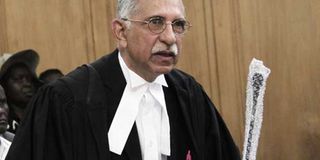Premium
Old English style mars Nowrojee’s attempts to versify

Senior Counsel Pheroze Nowrojee. Pheroze Nowrojee’s poems portray serious conflict between human beings and some superior overwhelming force. PHOTO | FILE
What you need to know:
- In one of his poems, titled Sonnet, he accuses people in authority of what he calls “executive oppression”.
- Most of his poems are political. He uses the term “Ritual” in a new way. Other poems show his interest in the politics of his adopted land.
- His poems are critical of religion and power in all their manifestations, and the absurd and farcical practices that come with them.
Pheroze Nowrojee’s poems portray serious conflict between human beings and some superior overwhelming force.
They have overtones of sorrow and disaster that cause pain and a sense of helplessness in the reader.
His early poems were published in Zuka, Busara, Maji Maji, New Statesman, African Perspectives, Xpressions Today, Joe Magazine, Law Monthly and Wajibu The Star. The earlier ones were anthologised and published in An Introduction to East African Poetry, a volume edited by Jonathan Kariara and Ellen Kitonga, The Fate of Vultures edited by Musaemura Zimunya, Peter Porter and Kofi Anyidoho and in Jeune Poisie Kenyane, edited by Merham Yaar (1994).
In 2001, Nowrojee was the BBC Network Africa Competition Prize-winner. He wrote a weekly column in the The Sunday Standard between 2004 and 2005.
In one of his poems, titled Sonnet, he accuses people in authority of what he calls “executive oppression”.
They use decrees and simple bans, to mete irreversible suffering on their subjects. The poet talks of the “simplest… by taking/The air from your nose .”
Most of his poems are political. He uses the term “Ritual” in a new way.
ABOVE CREED AND COLOUR
There are gory displays like banana arches, eyes of butchered goats and ostentatious partying on goat meat covering the foul blood-letting. He spares no one in his accusations— there are politicians, “solar-mitred” provincial commissioners and church leaders.
In bitter irony and acerbic sarcasm, he writes about empty and rabid officialdom at public events.
His poems are critical of religion and power in all their manifestations, and the absurd and farcical practices that come with them. It does not matter from where these images come. But as we look at the 20 poems he has sent us, we see that his concern about political power and religion has grown with years of the activities around him.
What is the meaning of flag independence without economic self-? What is the value of political independence if it does not bring human dignity to beggars?
In the poems he has arranged under a section he calls “Later Political Poems”, he talks about ethnic clashes as a tragedy: “Sometimes we call it skin/And sometimes kith and kin/But when the words are stripped and bare/It’s hatred that we want to share/Sometimes we call it a ‘zone’/And sometimes just ‘our own’/But underneath those words, so deep/Is the greed we want to keep/Sometimes it’s cleansing by ashes/And sometimes we call them clashes/But move those pretty words aside/And see the murder that they hide.”
The poet writes an epitaph to those who have suffered the tragedy of politics saying: “Do not because/You see a shared patch of brown/Conclude we therefore share all else/This most of all/I reject as the basis of sharing other things/A shared patch of colour/Any colour.”
He stands above race, creed and colour. His ultimate vision is expressed in this poem when he says:” The peaks of the mountains, now hidden, await us.”
Pheroze Nowrojee, like most of the poets of his generation, is a great admirer of Christopher Marlowe,the English poet and dramatist.
He has a poem entitled, The Big Man to His People: Urban Variations on a Pastoral Theme, in which he draws heavily from Marlowe’s The Passionate Shepherd to His Love with its universally known first line “Come Live With Me and be my love,” written in a pastoral style.
Pheroze Nowrojee’s poem is clothed in quaint Elizabethan overtones style with refrains and sentence constructions of the Elizabethan period.
He uses such words as “Opacity,” “ Munificence,” and “Clement days”, that only students of Shakespeare and Christopher Marlowe can readily comprehend.
Other poems show his interest in the politics of his adopted land.
HARD LABOUR
He has a deceptive interest in the sheer beauty of the land. But underneath, this are the problems that come with that beauty. For Nowrojee, Nature does not heal. It is merely an insignia of unending problems.
The people who represented hope have “disappeared, and over the horizon too/There was only more of this pitiless ocean/And abandonment/This is not rain, this is anger.”
For Nowrojee writing poetry is “Hard Labour”. He was born into a middle class family with opportunities to traverse Kenya, the country he loves and other landscapes in the region.
He has the whole of East Africa as their homeland.
Pheroze Nowrojee is one of the most prominent human rights activists in Kenya. He enjoys connections with India as an Indian Parsi.
Internationally, he is a barrister of Lincoln’s Inn and holds a BA from Xavier’s College.
He obtained an LLM from Yale in 1974. He is a citizen of the world. He has received multiple awards including International Bar Association. But despite the depressing situation around him, he is not without hope. In describing the land mass overlooking Entebbe he sees hope.
There is a quaint stylistic feature that runs through his poems and makes his well-chosen themes and subjects for his poems awe-inspiring.
His lines are couched in Elizabethan English and should be challenging to his 21st Century readers.
They mark an archaism that undermines Norwojee’s great effort to versify.




